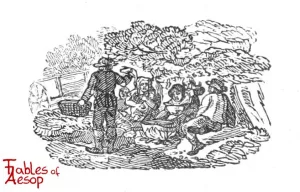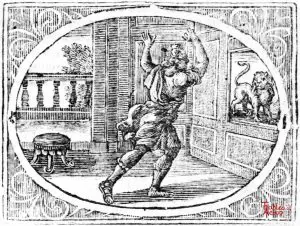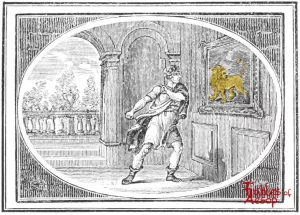A dream said King’s Son would be killed by a Lion. King built a fortress with a painted Lion for the Son. A thorn near the painting stuck the Son who died.
We had better bear our troubles bravely than try to escape them.

Townsend version
A king, whose only son was fond of martial exercises, had a dream in which he was warned that his son would be killed by a lion. Afraid the dream should prove true, he built for his son a pleasant palace and adorned its walls for his amusement with all kinds of life-sized animals, among which was the picture of a lion. When the young Prince saw this, his grief at being thus confined burst out afresh, and, standing near the lion, he said: “O you most detestable of animals! through a lying dream of my father’s, which he saw in his sleep, I am shut up on your account in this palace as if I had been a girl: what shall I now do to you?’ With these words he stretched out his hands toward a thorn-tree, meaning to cut a stick from its branches so that he might beat the lion. But one of the tree’s prickles pierced his finger and caused great pain and inflammation, so that the young Prince fell down in a fainting fit. A violent fever suddenly set in, from which he died not many days later.
Moral
We had better bear our troubles bravely than try to escape them.

JBR Collection (The Young Man and The Lion)
A Certain rich man, lord of a great estate, had an only son, of whom he was doatingly fond. The Young Man delighted in hunting, and went every day into the forest, in chase of wild beasts. His father believed firmly in dreams, omens, prognostics, and the like, and dreaming one night that his son was killed by a Lion, resolved that he should not go to the forest any more. He therefore built a spacious tower, and kept the Young Man there closely confined. That his captivity might be less tedious to bear, he surrounded him with books, music, and pictures; and on the walls of the tower were painted in life-size all the beasts of the chase, and among the rest a Lion. The Young Man stood one clay gazing for a long time at this picture, and, vexation at his unreasonable confinement getting the mastery 0ver him, he struck the painted Lion a violent blow with his fist, saying, “Thou, cruel savage, art the cause of all my grief!” The point of a nail in the wainscot under the canvas entered his hand; the wound became inflamed, festered, and mortified, and the Youth died from its effects.

Samuel Croxall (The Young Man and the Lion)
THERE was a certain old man, who was lord of a very great estate; and had only one child, a son, of whom he was exceeding tender and fond; he was likewise one very apt to be influenced by omens, dreams, and prognostics. The young Man, his son, was mightily addicted to hunting, and used to be up early every morning to follow the chase. But the father happening to dream, one night, that his son was killed by a Lion, took it so to heart, that he would not suffer him to go into the forest any more. He built a fine castle for his reception, in which he kept him close confined, lest he should step out privately a hunting, and meet his fate. Yet, as this was purely the effect of his love and fondness for him, he studied to make his confinement as agreeable to him as possible; and, in order to it, furnished the castle with a variety of fine pictures, in which were all sorts of wild beasts, such as the son used to take a delight in hunting; and, among the rest, the portrait of a Lion. This the young Man viewed one day more attentively than ordinary; and, being vexed in his mind at the unreasonable confinement which his father’s dream had occasioned, he broke out into a violent passion, and looking sternly at the Lion, Thou cruel savage, says he, it is to thy grim and terrible form that I owe my imprisonment, if I had a sword in my hand, I would thus run it through thy heart. Saying this, he struck his fist at the Lion’s breast, and unfortunately tore his hand with a point of a nail which stuck in the wainscot, and was hid under the canvas. The wound festered, and turned to a gangrene; this threw the young Man into a fever, and he died. So that the father’s dream was fulfilled by the very caution that he took to prevent it.
THE APPLICATION
This fable, though it may seem to favour and encourage the notion of dreams, and such fancied discoveries of future events, is however intended to ridicule and explode them. What can be more absurd than the practice of those credulous fools, who, having faith enough to believe the veracity of oracles, had the impudence or stupidity to try to defeat them afterwards? This was making a god with one hand, and throwing him away with the other. First they ask the Almighty what he intends to do. When he has told them, they believe and tremble, but are resolved to disappoint him if they can: nay, they think they can, and set about it accordingly. These low, inconsistent notions of God, gave the first birth to atheism: and were they not too common in the world still, that pernicious principle, if there be any such principle in reality, would be either entirely rooted out, or grow so thin, as not to hinder the increase of virtue. When the Deity, which the generality of the world acknowledge, is used as if he were a deity of irresolution, instability, mutability, and passion, men of any discernment immediately renounce such a deity as that; and, for want of due consideration, remain atheists. It being indeed less absurd of the two, not to believe a Supreme Being at all, than to believe he is subject to the frailties of us wretched mortals, and governed by whim and fancy.

Thomas Bewick (The Young Man and The Lion)
An opulent Old Man, who believed in omens and dreams, had an only Son, of whom he was dotingly fond. One night he dreamt that he saw the Young Man, while he was eagerly engaged in the chase, seized upon and torn in pieces by a Lion. This operated upon his fears to such a degree, that he instantly determined upon breaking off his Son’s strong propensity to hunting, that he might be kept out of harm’s way. For this purpose, he spared neither pains nor expence to make home agreeable to him. He had the rooms decorated with the finest paintings of forest scenery, and the hunting of wild beasts, with the reality of which the youth had been so much delighted; but the Young Man, debarred from his favourite pleasures, considered the palace a prison, and his father as the keeper. One day, when looking at the pictures, he cast his eye upon that of a Lion, and, enraged that he was confined for a dream about such a beast, he struck at the painting with his fist, with all his might. There happened to be a nail in the wall behind the canvas, which lacerated the hand terribly. The wound festered, and threw the Young Man into a fever, of which he died; so that the Father’s dream was fulfilled by the very step he took to prevent it.
APPLICATION.
Those people who govern their lives by forebodings and dreams, and signs of ill-luck, are kept in a state of constant anxiety and uneasiness. Such a disposition is grounded on superstition, which is the offspring of a narrow mind, and adds greatly to the evils with which life is sufficiently loaded. Heaven has kindly concealed from us the knowledge of futurity, and it is therefore foolish for us to attempt to pry into it, or to disturb our minds with absurd conceptions of events which are only realised by our ridiculous precautions against them. How inconsistent is the conduct of people who imagine things to be predestined, and yet busy themselves in endeavours to prevent their coming to pass; as if the vain efforts of human power or prudence were able to counteract the will, or reverse the decrees of the Omnipotent.


L’Estrange version (An Old Man and A Lyon)
A person of quaiity dream’t one night that he saw a lyon kill his only son: who was, it seems, a generous cavalier, and a great lover of the chase. This phansy ran in the father’s head, to that degree, that he built his son a house of pleasure, on purpose to keep him out of harms way; and spar’d neither art nor cost to make it a delicious retreate. This house, in short, was to be the young man’s prison, and the father made himself his keeper. There were a world of paintings every where up and down, and among the rest, there was the picture of a lyon; which stirred the bloud of the young man, for the dreame sake, and to think that he should now be a slave for the phansy of such a beast. In this indignation he made a blow at the picture; but striking his fist upon the point of a nayle in the wall, his hand cancerated; he fell into a fever, and soon after dy’d on’t: so that all the father’s precaution could not secure the son from the fatality of dying by a lyon.
Moral
A body may as well lay too little as too much stress upon a dreame; for some dreames are monitory, as others are only complexional: but upon the main, the less we heed them the better; for when that freake has once taken possession of a fantastical head, the distemper is incurable.

Pater, Filius, et Leo
Quidam senior filium habebat unicum, canum venaticorum amatorem. Per quietem hunc viderat a leone trucidari. Territus igitur ne forte eventus aliquando hoc somnium sequeretur, domum extruxit amoenissimam, illuc inducens filium. Custos illi aderat assiduus. Ad filii delectationem domo depinxerat omne genus animalium, cum quibus etiam leonem. Adolescens, haec inspiciens, eo magis molestiam contrahebat. Quodam autem tempore, propius leoni adstans, inquit, “O fera truculentissima, in hac domo asservor propter somnium inane patris mei. Quid tibi faciam?” Et ita dicens, manum incussit parieti, et offendebat in clavo qui illic latebat. Qua percussione manus emarcuit et sanies succrevit et febris subsecuta est et, brevi tempore, mortuus est. Ita leo adolescentem occidit, patris arte nihil iuvante.
Moral
Nemo potest devitare quae sunt ventura.
Perry #363

